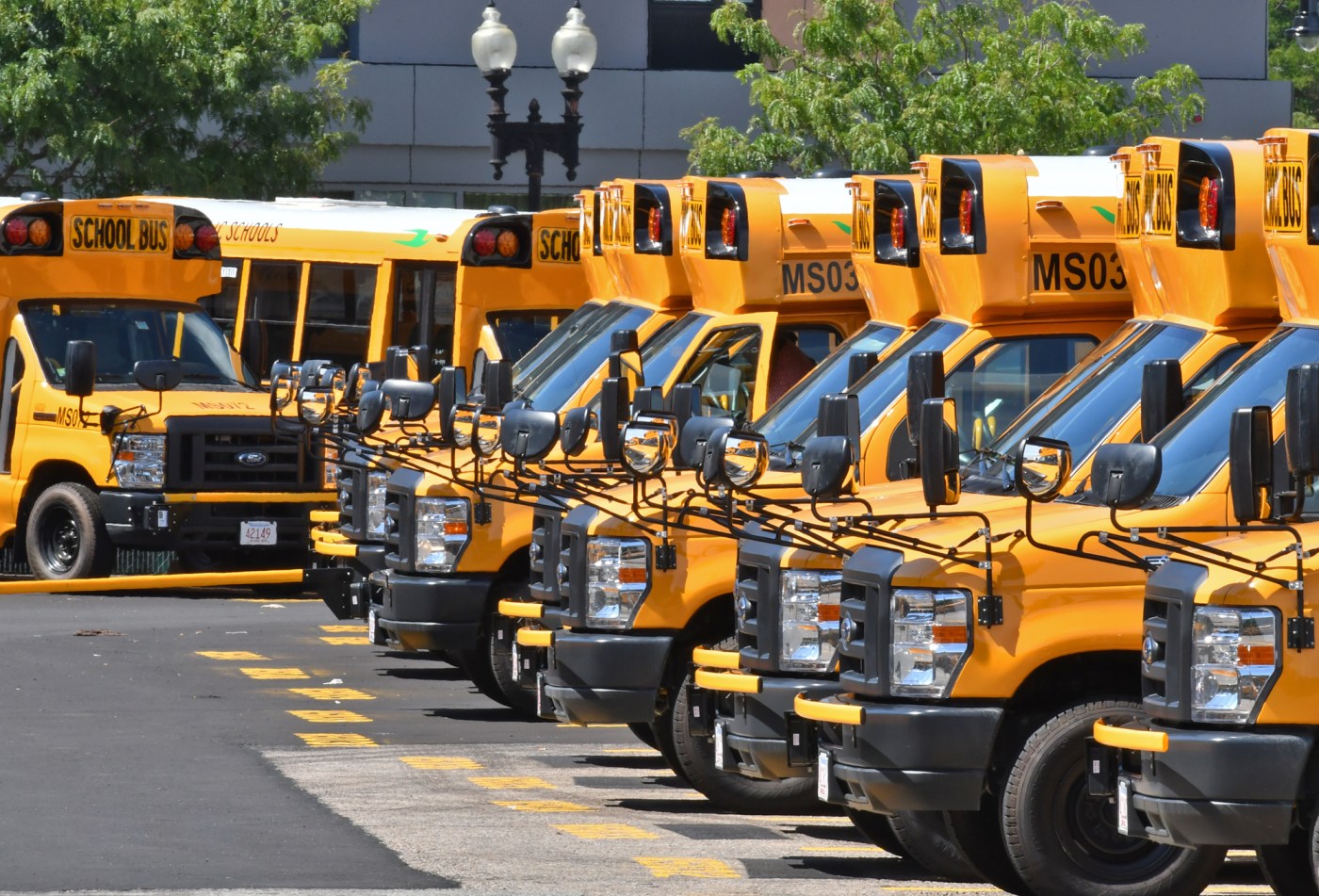
Hundreds of Stoughton students without bus service, as Massachusetts funds buses for migrants
Parents and students in Stoughton got some bad news on short notice last week, when the district announced that a lack of funding has led to a shortage of buses — and that 150 students will need to find another way of getting to school.
This comes as the state pays for buses for migrant students after the town accepted more than 200 migrant families into their community.
According to a letter sent to parents from Superintendent of Schools Joseph Baeta, affected families were notified about the bus shortage this past week. School starts in Stoughton on Sept. 4.
“We understand the feelings of disappointment and frustration this caused for the families who did not receive bus transportation,” Baeta wrote, before explaining “how we arrived at this point.”
Applications for bus transportation were up this year, according to the superintendent. Last year 1,367 applications were received, and this year it was 1,529 — an increase of 162. Students were placed in bus seats in the order their applications were received, Baeta wrote, but the school ran out of seats before it got through applications, and that’s not the only problem.
“Despite the increase in demand for bus transportation, we have one less bus than we did last school year. Last year we were able to have 14 buses, but due to budgetary constraints, we are only able to have 13 buses this school year,” he wrote.
This comes after the district sought and received a 7.1% increase in the schools fiscal 2025 budget, which the superintendent acknowledged. That increase, however, was to make ends meet as prices rise, and even then cuts were required.
“This increase still did not allow us to have a level-service budget, meaning we made cuts for supplies and even cuts in staffing, in addition to having to cut one bus,” he wrote.
According to a February letter from Stoughton Town Manager Thomas Calter to Gov. Maura Healey, the town has accepted at least 237 migrant families into their community, and it’s putting on a strain on resources across the board.
That strain was acknowledged by Baeta in his budget request this year, when he cited “an increase in PreK-12 enrollment, including in our migrant student population, and unprecedented pressures in special education, transportation, and services for English Learners,” along with inflation and other factors, as part of the reason for the 7.1% budget increase.
The arrival of migrant families in the Stoughton School District, according to the superintendent, is not the reason for the shortage of buses.
Those students will have two buses dedicated to their transportation, he said, but funding for that is coming from the state expressly for that purpose.
“The district has two buses for students living in hotels/shelters,” he wrote. “We are required to provide transportation for these students. These two buses are in addition to the 13 buses for the students not in hotels/shelters. We are utilizing funding the state provides to the district to bus the students living in hotels/shelters.
“The funding for these two buses does not come from our operational budget,” he added. “It is inaccurate to suggest that these children receiving busing is the reason yours did not. If we were not receiving the funding from the state for the students living in hotels/shelters, we would not be able to have these two additional buses.”
Stoughton does not charge students to ride the bus, but the superintendent said that, even if they did, it wouldn’t cover the cost of another bus.
“Even when the district did charge for busing, the fees collected only funded a portion of the cost to provide transportation and the balance of the cost was funded by the operational budget,” he said.
According to Baeta, at this point, there isn’t much the district can do except warn parents to make other arrangements for their children’s transportation.
“At this point, we are limited in what we can do to provide additional busing,” he wrote. “In addition, there is a shortage of bus drivers. That being said, we continue to review the bus lists for any discrepancies.”
According to state law, the district is not required to provide bus transportation for grade 7 through 12 students. All elementary students, according to the superintendent, were given bus seats.
Related Articles
Global immigration crackdown ensnares students studying abroad
City officials herald ‘desperately needed’ accessibility, infrastructure updates for East Boston School
Massachusetts AFL-CIO endorses ballot question to nix MCAS graduation requirement
Salvation Army distributes 850 backpacks to students for back-to-school
Massachusetts state, education leaders herald student performance, defend MCAS assessment
One apparently impacted parent took their frustrations to social media, asking the Stoughton News Facebook group how her student would get to school this year with “3 miles to and from school straight up Route 138” in between his home and education.
“Just got the word yesterday that our son, along with 149 other students, lost their seat on the bus…talk about Stoughton Pride. They didn’t even offer an alternative option like maybe paying for a ride which we would do because otherwise we have zero way of getting our son to school. This town is disgusting me,” they wrote.
The district has scheduled a virtual forum for concerned families on Monday from 6 to 7 p.m.
Neither the Department of Elementary and Secondary Education or the Executive Office of Health and Human Services returned a request for comment by press time.

